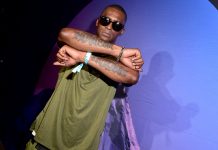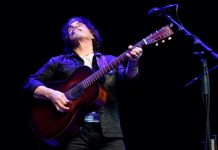
Courtesy Harold Daniels/Arrested Development
In 1992, Atlanta hip-hop outfit Arrested Development released its breakout single “Tennessee,” a song that prominently loops Prince whispering the state’s name on his Lovesexy track, “Alphabet St.” It’s a sample that Speech, the group’s frontman, credits for the song’s international success. In hindsight, though, the rapper also believes the Minneapolis legend, who never approved the sample’s original use, cared enough about other artists to not kill Speech’s burgeoning career before it truly began. (Prince’s lawyers asked for a modest $100,000— but no songwriting credit—instead of filing a lawsuit.)
So when Speech heard about Prince’s death, he was in utter disbelief, repeatedly refreshing his Twitter feed while driving home in hopes there had been some mistake. A few hours later, Speech spoke with us about his idol’s influence on him, his memorable encounters with the rock star, and how the Purple One’s music shaped Arrested Development’s catalog.
How did you first hear about Prince’s death?
My wife was telling me about it. Then I was checking Twitter to see if I could find any information. All of the sudden, my phone refreshed and it was the number one trending topic. I was driving and I just grabbed my chest, literally, feeling like I had lost an immediate family member. It’s hard to put into words how much it affected me. My wife, many times, offered for me to pull over. I just wanted to get home. I was flipping through the channels on the radio to see if this was true. I was in denial, hoping and praying it wasn’t real. Most people weren’t talking about it.
You have to understand for me, personally, Prince is literally my favorite artist of all time. Hands down. I’m just thoroughly moved by the millions of statements he’s made, not just lyrically, but visually, in the subject matter he’s tackled, the world he created and continued to recreate. It moved me time and time again. It’s been intense. I haven’t listened to any of his music other than what happened to catch on the radio or TV. I’ve been glued to the news. I’m still in disbelief.
Were you able to see him last week in Atlanta for what would be his final show?
No, I wasn’t. But I’ve seen him numerous times live and I’ve had the pleasure of meeting him and performing at Paisley Park.
When did you first meet him?
Prince was a person I was supposed to meet a number of times. He summoned me to meet him at Paisley Park back in 1993. I simply couldn’t make it. At the very moment he summoned me, I was mastering an album that I couldn’t get out of.
The next time, my bass player for Arrested Development, [Joseph McCreary, Jr., who goes by Foley,] had played for Miles Davis, and knew Prince personally. We were in Minneapolis on tour. He called Prince to see if we could come by. He said yes. On that particular day, Prince did not come out of hiding. I say hiding because, from what I heard from his band members, he was watching us from behind a one-way mirror! But he never came out. So that was interesting and… different.
When I finally met him, I was with one of my friends Victor Wooten, one of the best bass players on the planet. I was touring in his band, probably, around 2004 or 2005. He was invited to play at Paisley Park. I was part of that entourage and that reality. We performed there and got a chance to meet him right after that performance.
What was it like to finally meeting a decade or so later?
It’s surreal. He’s influenced me in ways that I can’t put into words as a writer, as a human being—my worldview. He has a lot to do with who I am as an individual. So, to meet that person, you’re not going to be able to put into words what that person means to you. Meeting him was fantastic. I told him how much I appreciate who he is and that he’s my favorite artist of all time. He said that never gets old to him. He appreciates that. Then he said: How is your career going?
That’s interesting given that you sampled Prince’s “Alphabet St.” without his permission on “Tennessee.”
I didn’t know how sampling laws worked at that time when we were releasing [3 Years, 5 Months & 2 Days in the Life Of…]. I don’t even think the industry knew how it all worked because it was such a new phenomenon. I sampled from “Alphabet St.” his word “Tennessee,” which obviously was the title of the first single. Anyway, we didn’t get the sample cleared. I didn’t know to clear it. We released the record.
I didn’t hear anything from anybody. He waited until the record peaked on the pop charts. As soon as it [dropped down], we got a call from his representatives. They wanted $100,000 for the sample. To be honest, now that I’ve been in the industry long enough, I realized that he really gave me a break. There were a few other things that he could’ve done. He could’ve demanded that the record be taken off the shelf, requested the sample be taken out of the record, demanded publishing and writing credits on the record. He didn’t do that. Instead, he wanted a flat fee. No writing credits—just $100,000.
In those days, when you had a [hit] throughout the nation, we made way more than that, so we paid it. But he waited for the very moment it went down the charts, and only once it went down, did we get the call. I think that was a testimony to his savvy and how he thought. Nonetheless, when we did meet up, he was a fan, and had respected what we had done.
Many artists attribute Prince as a musical influence. But in this case, your career was launched with the help of his work through the sample, as well as his willingness to not clamp down on Arrested Development’s rising career. Things could’ve happened so differently.
Without a question, I believe that. Could I have said the word Tennessee? I could have. Or I could’ve had someone else say it. But I’m a big believer that with every sample I used, you’re capturing more than the word or the melody or the beat, you’re capturing the spirit that’s on the tape. It’s like taking a photograph of someone where you capture a moment of happiness or sadness. There are things within that sample that are hard to describe. It inspired me. It influenced me. That song will forever mean so much to me. In light of his passing, it takes on a new level.
Going back to before “Tennessee,” do you recall when you first heard him? What about his work captivated you?
It was one of his first singles, “I Wanna Be Your Lover.” I thought it was a woman. At that time, his picture wasn’t everywhere, so I didn’t think it was a man. Then I investigated more about his music. I was 100 percent perplexed by Prince and a little conflicted about the words: I wanna be your mother AND your sister too. I didn’t understand who he was: Is he gay? Is he straight? As he continued to develop, and as I continued to see the visuals, he just always pushed the boundaries of what was normal, of what was acceptable. He constantly pushed my boundaries and challenged my thoughts. The music was so compelling that it kept me off-balance. It was like a rollercoaster ride.
When you listen back through Arrested Development’s catalog, where do you hear Prince the most?
I’ll put it this way: Ninety-nine percent of the songs we’ve ever created have been influenced by Prince and his sensibility. His mixture of funk and blues and jazz and pop, his melodic sensibility, it all plays a huge role, in particular on “Mr. Wendal” and even our new single, “I Don’t See You At The Club.” I’m a hip-hop artist. But the musicality of Prince and the poetry of his music is what made me write this new single. It’s the subconscious template that I write from every time. This song is no exception.
With songs like “Children Play With Earth,” I would pitch my voice; I’d pitch the audiotape down, so that when we put it back to regular speed, it had a lifted voice, sort of a chipmunk voice. That was a trick of Prince from many of his records where he’d take on the alter ego. What I think is beautiful, what I think is funky, and what I think is nasty, and sick, and awesome comes from a Prince worldview in a lot of ways.
Any fan of Arrested Development who’s read our interviews knows that Prince is my favorite artist. Fans of Prince come to our shows and bring to me gifts of Prince concerts, rare footage they capture at a club, or at Paisley Park. There’s a community in the sense of people who have been moved by Prince. He’s the greatest artist of our time.
Which record will you listen to first in his memory?
There’s so many songs I’ll end up playing. “The Ballad of Dorothy Parker” has always been one of my favorites off Sign ‘O’ The Times. “The Cross” is another wonderful song. In light of his death, I think of certain songs like “Under the Cherry Moon,” where he talks about how young heroes die, or “Sometimes It Snows in April,” where he’s talking about the fragile nature of life and the passion he’d want to live with while he’s alive. Those resonate, for some reason, for me on this day.
Prince put out so much in such a short amount of time. I feel like the energy force that was in this man is just inspiring as an artist. He’s a great example of knowing how much you can do, how much quality you can produce, within a [finite] time period, knowing that life is temporary.








![The North Carolina Museum of Natural Sciences’ newest exhibit is a [pre]historic first](https://cdn2.atlantamagazine.com/wp-content/uploads/sites/4/2024/04/DD-3-100x70.jpg)




